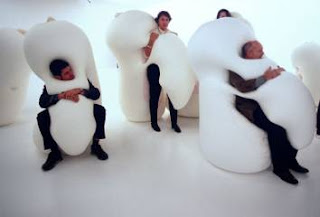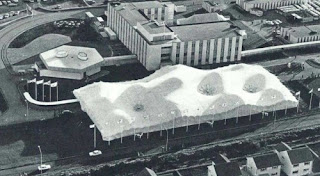The structures as rigid as they most seem, they can also be deformed, or altered in some way. like the installations of Ernesto Neto.
 |
| We are using the correct space, with a textile that lets us. Ernesto Neto |
Other type of deformed structure, is breaking a rhythm, or a pattern forming a totally arbitrary form.
 |
| Playing with a scanner and textiles to see the deformation of the structure, pedro serrano |
 |
| study on my sketch book |
This investigation of changing, adaptable structures, led to investigate Architect Frei Otto. The book was recommended by our teacher, Arq. Rodrigo Loaiza, the book is called "light weight constructions" by Frei Otto . More than his projects them selves, the ideas and the finality of each project caught my attention. Also looking into nature, like cob webs. Studying the structures purpose, and most important make models of some of them to see how that can be structured. This led my own investigation on creating my own textile, light weight structures.
 |
| Cast models in my study. |
 |
| replica of Frei Otto structure, made in studio |
 |
| Experimenting with the reticular deformation, made by a arc structure. |
After many experiments with light weight structures, i could see what Frei Otto said. Each structure should: Minimize mass, be adaptable, be ever changing, ephemeral.
"buildings should be dismantled when no longer in use" - Frei Otto. The reason is that we are always changing, our necessities to please will change continuously. Therefor our architecture should also change. This ever changing architecture is related to No Standard Architecture.
"the cry for form comes from those who have no idea of the origin and extent of the infinity of forms"-Frei Otto.
Creating a second skin on the earth, in that process new spaces are created.








